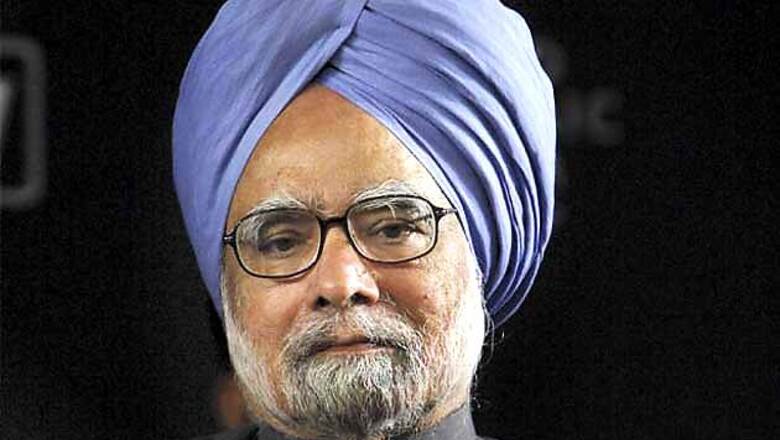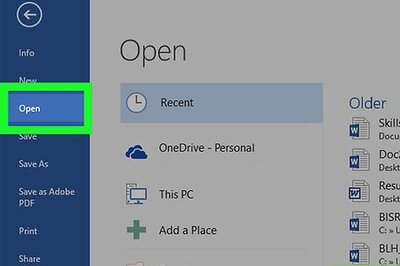
views
New Delhi: The Prime Minister is set to hold his first press conference in 3 years. Many are speculating that his interaction is possibly his last as the head of the country.
Although the PM does addresses journalists when he travels abroad, he is otherwise notoriously media-shy, uncomfortable in large press gaggles. This news conference will be Singh's only second such interaction in his second term as PM (since May 2009). However, he has met five editors and a group of television editors once each.
During his first term as the PM between 2004 and 2009, he addressed only one press conference.
Over the years, Singh's tenure as PM has been marked with several ups and downs. From high inflation rates, to rise in terror attacks, to several multi-crore scams, Singh-led government has been in the line of fire through the years.
Here is a look at his journey so far as the Prime Minister:
February 1, 2006
In his first interaction with journalists, Prime Minister Manmohan Singh had to defend himself from the Oppositions' criticism which described him as the "weakest" prime minister ever.
Singh had then said, "The proof of the pudding is in the eating. I have not done anything to deserve such epithets. I should be judged not by what Mr [LK] Advani says but what I do."
Who is more powerful, the Prime Minister's Office or the Congress President's office, was the other issue on which journalists sough Singh's clarification. The PM had said Sonia Gandhi had an influence on his government. This, he had added, was not a matter of weakness but a source of strength for him and his government.
Quote to remember: "Rome was not built in a day": When his attention was sought on energy situation, infrastructure and fiscal positions of state and the Centre.
May 24, 2010
Singh was questioned by journalists on when he was retiring.
Singh had responded by saying that there was no question of his retiring, until he had completed the work which had been handed over to him.
The PM had accepted that he had failed to do much in his first year in office, during UPA's second term.
Singh had hoped that the persisting inflation will cool. And he saw growth in 2010-11 rising to 8.5 per cent.
Quote to remember: "I would be the first person to admit that we could have done more"
During UPA regime, the growth rates were
7 per cent in 2004-05,
9.5 per cent in 2005-06,
9.6 per cent in 2006-07,
9.3 per cent in 2007-08,
6.7 per cent in 2008-09,
8.6 per cent in 2009-2010,
9.3 per cent in 2010-11,
6.2 per cent in 2011-12 and
5 per cent in 2012-13
Scams in UPA regime
Coal scam: The CAG report on the irregularities in auctioning 194 coal blocks created a massive uproar in political circles with the government being heavily criticised for causing a loss of Rs 1.86 lakh crore to the exchequer. The government's decision to not auction 194 coal blocks between 2004 and 2011 meant that the country lost a huge amount in revenue. The figure was initially believed to be more than Rs 10 lakh crore, but the CAG chose to keep PSUs out of its final report, bringing the figure down to Rs 1.86 lakh crore.
2G spectrum scam (2008): In 2008, the country issued 122 new telecom licences to several domestic companies that had little or no experience in the telecom sector, and at a price set in 2001. It is estimated that the spectrum scam led to a loss of Rs 1.76 lakh crore to the government.
Chopper scam (2012): Former Indian Air Force Chief Air Chief Marshal SP Tyagi was allegedly paid bribes to swing a Rs 3,600 crore deal for procuring 12 choppers from Italian firm Finmeccanica to ferry VVIPS.
Tatra truck scam (2012): The Enforecement Directorate had registered a case under the Prevention of Money Laundering Act (PMLA) in April, 2013 against Vectra Chairman Ravi Rishi and few other firms after former Army chief Gen V K Singh had alleged that he was offered a Rs 14 crore bribe in September, 2010 to clear the purchase of a tranche of 1,676 Tatra trucks for the Army.
CWG scam (2010): This has been another major scams during UPA government's regime. Even before the long awaited sporting bonanza could start, the grand event was caught in the web of irregularities on all quarters. According to the CAG, the estimated loss due to the irregularities was Rs 70000 crore. Former Commonwealth Games Organising Committee chairman Suresh Kalmadi and nine others were charged for allegedly cheating, conspiring and causing a loss of over Rs 90 crore to the exchequer in CWG-related corruption case.
Cash-for-vote scam (2008): On July 22, 2008, three BJP members - Ashok Argal, Faggan Singh Kulaste and Mahavir Bhagora - had flashed Rs1 crore cash in Lok Sabha alleging that the money was given to them by floor managers of the UPA government to secure their support during the no-confidence motion after Left parties withdrew their support over the Indo-US nuclear deal.The Delhi Police Crime Branch registered a case against the seven persons in 2009, and filed the first charge sheet against them in August 2011, for allegedly conspiring to conduct a 'sting operation' to show that they had been approached and bribed to favour the motion.
Adarsh Scam: The Adarsh plush 31-storey Housing Society in Mumbai's Colaba area was built for the welfare of serving and retired personnel of the Defence Services especially for the families of Kargil martyrs. In 2010, the media reports talked about discrepancies in the allotment of the flats. Top politicians, bureaucrats and others were found to have got flats allotted for themselves at artificially lowered prices. During the investigations, names of three former chief ministers of Maharashtra- Sushilkumar Shinde, Vilasrao Deshmukh and Ashok Chavan surfaced. Ashok Chavan had to step down from the Chief Minister's post after allegations. In April 2013 Judicial panel submitted report and on January 2014, Adarsh scam report is 'partially accepted'
IPL spot-fixing scam(2013): Three Rajasthan Royal players, S Sreesanth, Ajit Chandila and Ankeet Chavan, arrested for alleged spot fixing in the IPL by the Delhi Police on Saturday, May 18, 2013.
IPL scam : Shashi Tharoor's efforts to help his good friend (and later wife) Sunanda Pushhkar in the shareholding of the Kochi-IPL team cost him his job as minister of state for external affairs.IPL chief Lalit Modi published the shareholders details of Kochi-IPL team's franchise owners, Rendezvous Sports World, in his Twitter account. He also mentioned that he had been asked by Tharoor not to get into details of Sunanda Pushkar, who had been given a sweat equity of approximately 4.5 per cent of total equity (estimated worth by the media Rs 70 crore) in Kochi IPL team.The names of Union Agriculture Minister Shard Pawar and Aviation Minister Praful Patel (both belonging to the NCP which is an alliance partner in the UPA) came up in the IPL scam.
Satyam scam: (2009): B Ramalinga Raju, the prime accused in multi-crore Satyam Computers accounting scam case confessed that he had manipulated the accounts by $1.47-billion.
A stealth deal : In October 2005, India and France signed a Rs 16,000-crore Scorpene submarines deal. It was alleged that one of the accused in the Navy War Room leak case, Abhishek Verma, sent an e-mail to the French manufacturer of the submarine demanding, on behalf of the Congress, four percent commission to broker the deal. Various government agencies, including the IB, were involved in investigating the Navy War Room leak. In February 2006, the authorities decided to hand over the case to the CBI for initiating criminal proceedings against the naval officers and civilians allegedly involved. The CBI told the Delhi High Court that after preliminary investigations it had found no evidence of payment of kickbacks in the submarine deal.
S Band Scam ( February 2011) : The Hindu reported that the CAG has started enquiries into a 2005 agreement between the ISRO's commercial arm Antrix Corporation Ltd and Devas Multimedia Pvt Ltd over ISRO launching two satellites for Devas. The daily said Devas was to allegedly benefit unbridled use of 70 Mhz of the scarce S-Band spectrum over a 20 year period from which the CAG has made preliminary estimate of a loss of Rs. 2,00,000 crore to the exchequer.
Railway bribery scam ( May 2013): The alleged scam came to light after CBI on May 3 raided the office and residence here of Bansal's nephew Vijay Singla who was caught red-handed with an amount of Rs 90 lakh.The money was allegedly the bribe amount which the then Railway Board member (staff), Mahesh Kumar, had paid Singla for a choice posting.Bansal had quit as minister in the wake of the scam.
UPA'S HIGHS
June 2005: RTI Act passed
Aug 2005: MNREGA passed
Nuclear deal: End of nuclear isolation and technology denial
Moon mission: On Oct 22, 2008, India entered into the exclusive club of six nations with successful moon mission by launching Chandrayaan-I.
Railways' turn around under Laloo: From a near bankruptcy five years ago to a cash surplus of Rs 90,000 crore by 2008, as Laloo claimed in the recent interim budget, this is the most dramatic turn-around story of UPA
Economic boom: GDP galloped for first four years- 7.5 per cent, 9.5 per cent, 9.7 per cent and 9 per cent between 2004-05 to 2007-08 (7.1 per cent for 2008-9 projected in budget 2009) giving India three consecutive years of 9 per cent or more growth rate. India was put on path of high growth before global meltdown and inflation put breaks.
UPA on Economics Growth 2011:12 6.2 per cent 2012-13: 5 per cent
1300 KM road built in North-East
NREGA: Introduced in 2006 in 200 districts covers entire country now, guaranteeing employment of 100 days in every financial year to adult members of any rural household willing to do public work-related unskilled manual work at the statutory minimum wage.
RTI: Came into being 2005, covers entire country except Jammu and Kashmir, ushered in a new era of right to information and transparency in governance. This followed NDA's dud Freedom of Information Act of 2002 which never came into force
Protection of women against domestic violence Act, 2005: Came into force in Oct 2006, primarily meant to provide protection to the wife or female live-in partner from domestic violence at the hands of the husband or male live-in partner or his relatives, the law also extends its protection to women who are sisters, widows or mothers.
New IITs and IIMs: 8 IITs and 7 IIMs and 30 Central, world class universities planned for 11th five-year plan. Six of the new IITs and one IIM - in Shillong - started offering courses in the 2008. Remaining two IITs will start admitting students this year.
Forest Right: The Scheduled Tribes and Other Traditional Forest Dwellers (Recognition of Forest Rights) Act, 2006, came into force from Dec 31, 2007, is a landmark piece of legislation that gives rights of forest dwelling communities to land and other resources, denied to them over decades as a result of the continuance of colonial forest laws in India.
Delhi win: Third consecutive win in Delhi on showcashing development was a glorious moment for UPA.
June 2008: Loan waiver scheme passed
Oct 2008: INDO-US nuclear deal agreed
Aug 2009: Right to Education Act passed
Dec 2012: Govt wins crucial vote in FDI on Multi-brand retail
January 2013: Direct Benefit Transfer roll out
Dec 2013:Congress won election in Mizoram
UPA'S LOWS
July 2008: Cash for Vote Scandal
Terror attacks: A long list of them ending with 26/11attack. Before that blasts in ahmedabad, bangalore, jaipur, delhi, guwahati, manipur, agartala in 2008; samjhauta express blast 2007, hyderabad blasts 2007 train blasts of mumbai 2006, malegaon blasts 2006, varanasi blast 2006. Both internal and external elements involved showing gross failure of intelligence and internal security mechanism.
New low in Indo-Pak relations following 26/11, India has unleashed coercive diplomacy against Pak. All attempts at rebuilding relations in past several years gone up in smoke.
High inflation followed by slow down: Inflation touched a high of 12.91% in Aug 2008; while fighting inflation the tightened monetary policy led to credit crunch and combined with global meltdown slowed down growth from over 9% to 7% in matters of months.
Job loss: According to Labour Ministry report 5 lakh people lost their jobs on account of slowdown during the four-month period ending December. Worst hit are automobiles, IT, textiles and export sectors. More loss expected.
Cash-for-vote scam: Three BJP MPs displayed bundles of currency notes worth Rs 1 crore in Lok Sabha alleging they were offered huge sums of money to help the government secure the trust vote on July 22 last year in the wake of the crisis over the Indo-US nuclear deal. A Lok Sabha committee exonerated Amar Singh and Ahmed Patel but sought probe against Sajeev Saxena, Sudheendra Kulkarni and Sohail Saxena. Delhi Police asked to probe the matter on January 29, 2009.
Stock market collapse: FIIs, which were pumping money at a never-seeen-before rate pulled out, market crashed from an all-time high of 21,000+ to less than 8,000 at BSE. This led to a spate of suicides all over the country. Periodic intervention of former FM Chidambaram and RBI governor have failed to boost market sentiment.
Satyam/Maytas scam: On Jan 7, 2009, Raju created a stir by resigning and confessed that Satyam's balance sheet carried inflated figures for cash and bank balances of Rs 5,040 crore, carried an accrued interest of Rs 376 crore which was non-existent and an understated liability of Rs 1,230 crore. Satyam's management was taken over by a govt-appointed panel. Similar scam was suspected in Maytas Infra and Maytas Properties, other family owned concerns and govt declared to take over its management some days ago.
Agrarian crisis/Farmers' suicide: NCRB data: In the five years till 2001, there were 15,747 farmers' suicides a year on average. For the six years from 2002, that average is 17,366 farmers' suicides each year. In last year's budget govt provided Rs 71,000 crore loan waver, but suicide continues, specially in Vidarbha, which had received over Rs 10,000 crores in special packages from Centre and State government.
CBI flip-flop on Mulayam, Mayawati in DA cases as political alliance goes through highs and lows with both Samajwadi Party and BSP over the years.
Shibu Soren: A Union Minister goes missing for days following arrest warrant against him, becomes CM under questionable circumstances only to be forced to resign days later due to lack of support, becomes CM again only to lose by-election and resign
Electoral loss: Lost elections in Punjab, Karnataka, Madhya Pradesh, Chhattisgarh in 2012
July 2009 : Indian government blunders in mentioning Balochistan in a Joint statement issued after talks with Pakistan at Sharm-EL-shaikh, Egypt
August 2009: CAG report on 2G scam
October 2009: CBI files FIR in 2G spectrum case
June 2010: Petrol pricing decontrolled
August 2010: CAG exposes govt irregularities in 2G Scam
November 2010: Nira Radia tapes leaked, SC-monitors CBI probe ordered into 2G scam, A.Raja resigns
January 2011: Suresh Kalmadi sacked
June 2011: Delhi Police lathicharge Ramdev supporters at Ramlila Maidan
July/Aug2011: Anna Hazare's 11 day fast catches nation's imagination
May 2012: Army Chief Gen.V.K.Singh passes the baton after controversial tenure
Aug 2012: CAG report on coal block allocation tables in Parliament
Dec 2012: Delhi Gangrape protest
January 2013: Diesel price partially decontrolled
February 2013: Coptergate explodes
March 2013: DMK quits UPA on Sri Lanka Tamil issue
April 2013: Chinese encroach 19KM into Indian territory
May 2013: Resignation of Law & Railway ministers
December 2013: Congress loses elections in four states including Delhi, Rajasthan, MP, Chhattisgarh
Key Bills passed by Parliament in 2013:
Lokpal Bill- The amended Bill was passed by the Rajya Sabha on December 17, 2013 and by the Lok Sabha on Dec 18, 2013 & finally got President Pranab Mukherjee's assent on January 1, 2014
National Food Security Bill, 2013 aims to provide subsidised foodgrains to two-third of India's 1.2 billion people.
The Right to Fair Compensation and Transparency in Land Acquisition, Rehabilitation and Resettlement Bill, 2013 seeks to provide fair compensation to those whose land is taken away and rehabilitation of those affected by land takeover.
Companies Bill, 2011 seeks to enhance transparency, make corporate social responsibility mandatory and protects the interest of employees and small investors.
The Pension Fund Regulatory and Development Authority Bill, 2013 paves the way for individuals to widen their post-retirement cover and allows foreign investors to acquire up to 26 percent stake in the sector.
The Parliament (Prevention of Disqualification) Amendment Bill, 2013 negates a Supreme Court order banning politicians in jail and under police custody from contesting polls.
Prohibition of Employment as Manual Scavengers and Their Rehabilitation Bill, 2012 aims at elimination of dry latrines and manual scavenging and the rehabilitation in alternate occupations of those engaged in this task.
Bills passed by Rajya Sabha: Marriage Laws Amendment Bill, 2010 provides for irretrievable breakdown of marriage as a ground for divorce, and makes divorce provisions women-friendly.
Women reservation Bill passed in Rajya sabha
Bills passed by Lok Sabha: Street Vendors (Protection of Livelihood and Regulation of Street Vending) Bill, 2012 provides for protection of livelihoods rights, social security of street vendors and regulation of urban street vending in the country.
Other bills passed by the two houses include the National Highways Authority of India (Amendment) Bill, 2012, the Securities and Exchange Board of India (Amendment) Bill, 2013 and The Wakf (Amendment) Bill, 2011.
Parliament lost over 1,000 hours due to disruptions
Disruptions and forced adjournments led to the loss of 577 hours in the 15th Lok Sabha while the Rajya Sabha lost 442 hours.
The 7th Citizens' Report on Governance and Development 2013 by National Social Watch said 152 parliamentarians (31 percent) in the Lok Sabha have criminal cases against them while a total of 17 percent of women parliamentarians have cases pending against them as well.
The total value of assets of 542 MPs in the Lok Sabha is Rs 29.2 billion, with an average of Rs 53.8 million each.
The report said that in nine sessions in 2010-12, Lok Sabha worked for less than two-thirds of the time per day. As a result, the number of pending bills doubled during this time from 49 to 104.
Out of 34 bills passed during 2011, five were passed in less than five minutes and another six within 30 minutes.



















Comments
0 comment